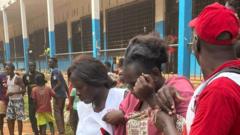A recent exam conducted in Nigeria faced severe technical glitches, leaving nearly 80% of candidates unable to achieve passing scores. The crisis culminated in a student's suicide, sparking calls for accountability and significant reforms in the educational assessment system.
Nigeria's Exam Crisis: Low Scores, Technical Issues, and a Tragic Suicide

Nigeria's Exam Crisis: Low Scores, Technical Issues, and a Tragic Suicide
Unprecedented technical failures during Nigeria's university entrance exams have led to a devastatingly low pass rate, stirring public outrage following the tragic suicide of a student.
Nigeria’s education crisis deepened this week after a series of technical malfunctions during university entrance exams resulted in a dismal pass rate. Nearly 80% of students, facing power outages and unresponsive computer systems, were unable to secure the necessary grades, prompting outrage and despair.
The Joint Admissions and Matriculation Board (JAMB) acknowledged a "technical glitch" that interfered with the examination process, undermining the performance of applicants. Grievances surfaced as students reported being unable to log in, losing access to exam questions, and battling major power cuts during their assessments.
Tragically, the failure of these exams directly contributed to the death of 19-year-old Faith Opesusi Timileyin, who aspired to study microbiology at the university. Her family disclosed that she succumbed to despair after receiving an unsatisfactory score of 146 out of a possible 400 for the second consecutive year. Her father confirmed that the grief over her academic challenges drove her to take her own life.
Across the nation, the statistics echoed this distress. Of the 1.9 million candidates who took the Unified Tertiary Matriculation Examination (UTME), only 400,000 achieved the threshold mark of 200 needed to gain university admission, one of the poorest showings in years.
Students like Favour Eke found their exams riddled with chaos, with questions missing from their screens, leading to significant anxiety and confusion. Complicating matters further was the inability to access their results, leaving many like her virtually hopeless about their academic prospects.
In a tearful press conference, the JAMB registrar, Ishaq Oloyede, extended heartfelt apologies, recognizing the "painful damage" inflicted on students and promising that nearly 380,000 candidates from 157 affected centers could retake their exams. The incidents primarily transpired in Lagos and south-eastern states, where the computer systems failed to operate effectively.
While some defend the low scores as an authentic reflection of current academic capacity, there is widespread demand for accountability at the highest levels. Critics, including opposition leader Peter Obi and activist Rinu Oduala, have called for immediate reforms as well as potential criminal charges against those responsible, characterizing it as gross incompetence and educational sabotage.
This alarming incident raises serious questions regarding the integrity of Nigeria's educational assessments and the need for comprehensive reforms to prevent future tragedies.



















